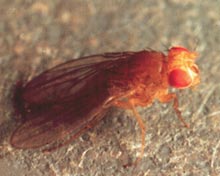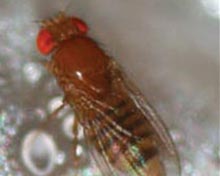
University of Minnesota Extension

University of Minnesota Extension
Fruit Flies
General Descriptions
Also known as vinegar flies, fruit flies are attracted to sweet or fermented liquids such as liquor, syrup, soda pop
and vinegar, in addition to ripening/rotting fruit. Females lay eggs in and around these materials upon which their
tiny larvae feed. The gnat-sized adults are up to one-eighth of an inch long and typically have tan-colored bodies
and red to brown eyes.
General Control
Properly storing fruits and vegetables especially during summer and early fall can reduce the chances of having
fruit flies. Storing mops and rags clean and dry, and cleaning out drains, garbage disposals and trash receptacles
also will eliminate fruit fly breeding sites. It takes less than a week for a fruit fly to develop from egg to adult, so
problems can quickly arise.









